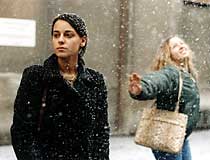Austrian director Michael Haneke has been
making unsettling dissections of contemporary society since his
debut film, "The Seventh Continent" (1989), which matter-of-factly
presented a middle-class family methodically preparing to commit
suicide.
With stories like that, it’s no wonder Haneke hasn’t been enthusiastically
received by critics or by audiences; that is, until his 2002
film "The Piano Teacher" swept the Cannes Film Festival
with its shocking exploration of a repressed schoolteacher’s
sexual odyssey.
"The Piano Teacher" – which features Isabelle Huppert
in a daring performance in the title role – is the obvious highlight
of the BAMcinématek series, "Breaking Rules: New
Austrian Cinema," which runs Nov. 13-23. "Breaking
Rules" looks back at the last five years of Austrian filmmaking,
which includes – as most European films (at least the ones we
see here) seem to be – studies of social, political and cultural
difficulties that are as far from the Hollywood ideal of brainless
junk food as possible.
It’s too bad that more Haneke films aren’t included, like his
latest (and still-unreleased) "Time of the Wolf." But
"The Piano Teacher" (showing Nov. 22) is an excellent
introduction to his relentlessly punishing style of filmmaking,
and maybe this will convince BAM to bring a long-overdue Haneke
retrospective to Brooklyn in the near future.
Another high-profile director, Ulrich Seidl, was prominently
featured during the 2002 BAM Next Wave festival as the "Next
Director." His latest film, "Jesus, You Know"
(2003), opens the series on Nov. 13. A strange hybrid of documentary
and voyeurism, "Jesus, You Know" shows six deeply religious
people as they pray – out loud – in church. Seidl shoots them
as they kneel down and look into the camera, making the viewer
uncomfortably complicit in their tattered lives. Is he sympathizing
with or mocking them? Only Seidl knows for sure.
One of the most successful Austrian films of recent years, "The
Inheritors" (1998) – which won prizes and praise at festivals
as diverse as New York, Toronto and Rotterdam – comes to BAM
on Nov. 16. Stefan Ruzowitzky’s surprisingly nimble comedy is
about socialism hilariously gone amok after the owner of a collective
farm is killed and the workers take over its operation.
It’s unfortunate that sexism still exists in the film world today
to the extent that it must be pointed out when female directors
do good work (to distinguish them from often less-than-able male
directors). But, by any standard, the women filmmakers of "Breaking
Rules" are a talented lot.
"East of War," a 1997 documentary by Ruth Beckermann,
ends the series on Nov. 23. "East of War" shines a
bright light on a period that many Austrians, it seems, would
rather keep hidden: the ultra-violent Eastern Front campaigns
during the latter days of World War II, when many Austrians –
even after Germany’s loss was no longer in doubt – partook in
heinous war crimes.
Beckermann never flinches in her interviews with many armed forces
veterans: although most of them own up to the fact that many
horrific atrocities occurred, there are some who are still in
denial, fighting tooth and nail to the end for a lost cause:
defending those actions as just part of being at war.
"Lovely Rita" (2001), by Jessica Hausner (showing Nov.
15), is a relatively brief character study of a teenager – played
with forcefulness by Barbara Osika – whose life is filled with
hardships both within and outside of her family. Even at a mere
80 minutes, the oppressiveness of Rita’s existence is a bit much
to take. It’s too bad Hausner didn’t take a cue from the beguiling,
upbeat Beatles classic from which she gets her title.
Last month, the New York Film Festival showed Barbara Albert’s
newest film, the disappointing "Free Radicals"; BAMcinematek
is smartly showing Albert’s far superior debut from 1999, "Northern
Skirts" (also showing Nov. 15).
Ostensibly a look into the lives of five teenage refugees from
the former Yugoslavia at the height of the Bosnian War in 1995,
Albert’s film is much more complex: by showing how these kids
– especially the two girls we follow most often, played wonderfully
by Nina Proll and the unforgettable Edita Malovcic – handle the
difficulties of learning how to live in another country with
all the odds against them, Albert creates a subtle and compelling
portrait of a new Europe that hasn’t yet broken free from the
shackles of the old.
Editor’s note: Additional films showing
as part of "Breaking Rules: New Austrian Cinema" include:
Sabine Derflinger’s "Step On It" (2002) on Nov. 14;
Gustav Deutsch’s "Film Ist 7-12" (2002) on Nov. 14;
Michael Glawogger’s "Megacities" (1998) on Nov. 16;
Austrian experimental shorts on Nov. 18; New Austrian shorts
on Nov. 20; Nikolaus Geyrhalter’s "Elsewhere" (2001)
on Nov. 21; Florian Flicker’s "Hold-Up" (2000) on Nov.
22 and Martina Kudlacek’s "In the Mirror of Maya Deren"
(2002) on Nov. 23.
BAMcinématek presents "Breaking
Rules: New Austrian Cinema," Nov. 13-23, at 30 Lafayette
Ave. at Ashland Place in Fort Greene. Tickets are $10. For more
information, call (718) 636-4100 or visit www.bam.org

























